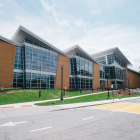Candidates Mitt Romney and President Barack Obama squared-off Tuesday night from Long Island’s Hofstra University in the second of three 90-minute debates before the Nov. 6 election.
The interruption-filled debate, moderated by CNN’s chief political correspondent Candy Crowley, took the form of a town hall meeting. Candidates were asked prescreened questions by self identified, undecided audience members on topics including but not limited to education, energy independence, tax cuts, women’s workplace equality, job creation, immigration, gun control and America’s place in the global economy.
Obama challenged Romney more than he did in the first presidential debate, having received strong criticism from his own party members following the last debate.
“Gov. Romney doesn’t have a five-point plan,” Obama said. “He has a one-point plan. And that plan is to make sure that folks at the top play by a different set of rules.”
“I was definitely shocked with how aggressive Obama was in the beginning,” said Weston Slaton of the KSU College Republicans. “He really came out swinging.”
“I think Barack Obama had the edge,” said Eric Brito, president of the KSU Young Democrats. “I think he brought his A-game and he knew he had to do better in this debate or it would be detrimental to his campaign.”
One major issue in the Tuesday night debate was the ability of both candidates to use political rhetoric as a means of avoiding direct questions. Candy Crowley was tasked to keep the candidates on topic, but both were guilty of circumventing direct questions with long-winded responses that were often times irrelevant.
One person unimpressed by the performances of both candidates was Michael Zeman, vice president of the College Libertarians of Kennesaw State University.
“I felt as if I was watching a middle school shouting match between children,” Zeman said. “They were not passionate, they were not energetic and neither one of them directly answered a question the whole debate.”
In addition to answering questions with vague and ambiguous responses, both candidates were quick to interrupt each other and the moderator to get the final word, what some news agencies, including USA Today, called “The Interruption Debate.”
One study conducted by The Center for Media and Public Affairs at George Mason University found that Obama cut off Romney 36 times in midsentence, while Romney cut off Obama 28 times. Moderator Candy Crowley interrupted both candidates for impeding the format of the debate. Based on the study, 122 total interruptions occurred during the 90-minute debate.
“I’m not personally a fan of disruption tactics,” said Dean of Student Success Michael Sanseviro. “Both candidates had moments when their level of argumentativeness seemed more show than substance.”
CBS and The Washington Post reported that the candidates are deadlocked in national polls with only two weeks until the election. The Associated Press, among others, reported that the 2012 presidential election will fall into the hands of undecided voters residing in swing states. The vast majority of people polled cited the economy as the main issue driving their ballots.
“I’m never really sure how much the debates truly impact voting habits,” Sanseviro said. “Whenever there is a tight race, even minimal impact on undecided voters can make a difference.”
Both campaigns are focusing their attention on the key battleground states that will ultimately decide the election. The third and final debate takes place Monday at 9 p.m. from Boca Raton, Fla.



